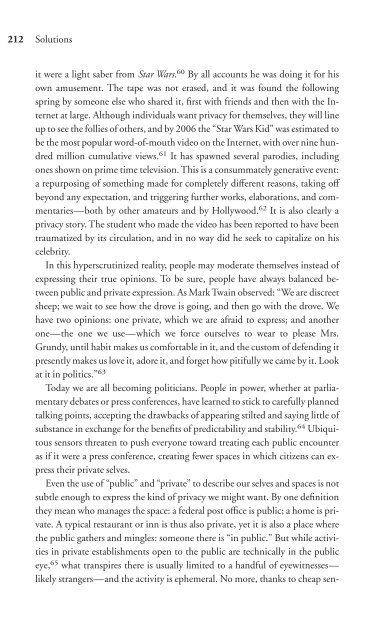Download - Future of the Internet â And how to stop it.
Download - Future of the Internet â And how to stop it.
Download - Future of the Internet â And how to stop it.
Create successful ePaper yourself
Turn your PDF publications into a flip-book with our unique Google optimized e-Paper software.
212<br />
Solutions<br />
<strong>it</strong> were a light saber from Star Wars. 60 By all accounts he was doing <strong>it</strong> for his<br />
own amusement. The tape was not erased, and <strong>it</strong> was found <strong>the</strong> following<br />
spring by someone else who shared <strong>it</strong>, first w<strong>it</strong>h friends and <strong>the</strong>n w<strong>it</strong>h <strong>the</strong> <strong>Internet</strong><br />
at large. Although individuals want privacy for <strong>the</strong>mselves, <strong>the</strong>y will line<br />
up <strong>to</strong> see <strong>the</strong> follies <strong>of</strong> o<strong>the</strong>rs, and by 2006 <strong>the</strong> “Star Wars Kid” was estimated <strong>to</strong><br />
be <strong>the</strong> most popular word-<strong>of</strong>-mouth video on <strong>the</strong> <strong>Internet</strong>, w<strong>it</strong>h over nine hundred<br />
million cumulative views. 61 It has spawned several parodies, including<br />
ones s<strong>how</strong>n on prime time television. This is a consummately generative event:<br />
a repurposing <strong>of</strong> something made for completely different reasons, taking <strong>of</strong>f<br />
beyond any expectation, and triggering fur<strong>the</strong>r works, elaborations, and commentaries—both<br />
by o<strong>the</strong>r amateurs and by Hollywood. 62 It is also clearly a<br />
privacy s<strong>to</strong>ry. The student who made <strong>the</strong> video has been reported <strong>to</strong> have been<br />
traumatized by <strong>it</strong>s circulation, and in no way did he seek <strong>to</strong> cap<strong>it</strong>alize on his<br />
celebr<strong>it</strong>y.<br />
In this hyperscrutinized real<strong>it</strong>y, people may moderate <strong>the</strong>mselves instead <strong>of</strong><br />
expressing <strong>the</strong>ir true opinions. To be sure, people have always balanced between<br />
public and private expression. As Mark Twain observed: “We are discreet<br />
sheep; we wa<strong>it</strong> <strong>to</strong> see <strong>how</strong> <strong>the</strong> drove is going, and <strong>the</strong>n go w<strong>it</strong>h <strong>the</strong> drove. We<br />
have two opinions: one private, which we are afraid <strong>to</strong> express; and ano<strong>the</strong>r<br />
one—<strong>the</strong> one we use—which we force ourselves <strong>to</strong> wear <strong>to</strong> please Mrs.<br />
Grundy, until hab<strong>it</strong> makes us comfortable in <strong>it</strong>, and <strong>the</strong> cus<strong>to</strong>m <strong>of</strong> defending <strong>it</strong><br />
presently makes us love <strong>it</strong>, adore <strong>it</strong>, and forget <strong>how</strong> p<strong>it</strong>ifully we came by <strong>it</strong>. Look<br />
at <strong>it</strong> in pol<strong>it</strong>ics.” 63<br />
Today we are all becoming pol<strong>it</strong>icians. People in power, whe<strong>the</strong>r at parliamentary<br />
debates or press conferences, have learned <strong>to</strong> stick <strong>to</strong> carefully planned<br />
talking points, accepting <strong>the</strong> drawbacks <strong>of</strong> appearing stilted and saying l<strong>it</strong>tle <strong>of</strong><br />
substance in exchange for <strong>the</strong> benef<strong>it</strong>s <strong>of</strong> predictabil<strong>it</strong>y and stabil<strong>it</strong>y. 64 Ubiqui<strong>to</strong>us<br />
sensors threaten <strong>to</strong> push everyone <strong>to</strong>ward treating each public encounter<br />
as if <strong>it</strong> were a press conference, creating fewer spaces in which c<strong>it</strong>izens can express<br />
<strong>the</strong>ir private selves.<br />
Even <strong>the</strong> use <strong>of</strong> “public” and “private” <strong>to</strong> describe our selves and spaces is not<br />
subtle enough <strong>to</strong> express <strong>the</strong> kind <strong>of</strong> privacy we might want. By one defin<strong>it</strong>ion<br />
<strong>the</strong>y mean who manages <strong>the</strong> space: a federal post <strong>of</strong>fice is public; a home is private.<br />
A typical restaurant or inn is thus also private, yet <strong>it</strong> is also a place where<br />
<strong>the</strong> public ga<strong>the</strong>rs and mingles: someone <strong>the</strong>re is “in public.” But while activ<strong>it</strong>ies<br />
in private establishments open <strong>to</strong> <strong>the</strong> public are technically in <strong>the</strong> public<br />
eye, 65 what transpires <strong>the</strong>re is usually lim<strong>it</strong>ed <strong>to</strong> a handful <strong>of</strong> eyew<strong>it</strong>nesses—<br />
likely strangers—and <strong>the</strong> activ<strong>it</strong>y is ephemeral. No more, thanks <strong>to</strong> cheap sen-


